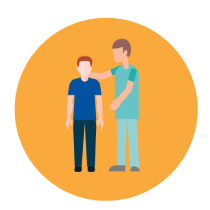Where is your patient on their FOP journey?
As a lifelong condition, it is crucial that people with FOP are supported throughout the course of their disease. This page highlights how you can help people with FOP and their caregivers face some of the challenges that may arise.
Click on the links below to find resources designed to complement your care.

How can you help?

FOP diagnosis
How do I know if my patient has FOP?
Early diagnosis of FOP is essential to help delay or prevent disease progression and avoid unnecessary harm.1,2 FOP can be diagnosed clinically on the presence of certain ‘red flags’; however, due to the rarity of FOP, many physicians are unaware of the common signs.2,3

Adjustment period
How can I support my patient after an FOP diagnosis?
Being diagnosed with FOP can be an isolating time for patients and their families. Patient support organizations can help by connecting patients with other people going through similar experiences.4,5

Establishing a
care network
How can I provide my patient with the multifaceted care they require?
FOP falls under many medical specialties and a multidisciplinary approach is essential for high-quality patient care. Primary care physicians can support patients by advocating for access to expert healthcare and coordinating a multidisciplinary team.6–8

Living with FOP
What do I need to be aware of when managing patients with FOP?
Medical management for FOP is supportive and patients may require adaptations to daily living as the disease progresses.8 As minor trauma can trigger new flare-ups,9,10 special medical considerations need to be taken to prevent disease exacerbation.8

How can you help?
View the diagnostic handbook from Tin Soldiers for key steps to identifying FOP, and visual examples of the signs and symptoms.
IFOPA have created a welcome packet full of information and resources to support newly diagnosed patients.
View our guide to the multidisciplinary network to learn more about the ways it can work, and the specialties involved.
The ICC provides guidelines on the medical management of FOP, developed by FOP experts across a range of specialties.
Read and download this leaflet for more information on how to recognize FOP.
Find out which patient organizations are active near you and how your patients can contact them.
Use our search tool to locate physicians near you who are familiar with FOP management.
Read a two-page summary of the ICC guidelines aimed specifically at emergency care providers.
Work through three fictional patient case studies to learn more about diagnosing FOP.
The IFOPA emergency toolkit helps your patients share their medical history with medical professionals as quickly as possible.
Read and download this leaflet to learn more about the progression of FOP and how you can help your patients after diagnosis.
ICC, International Clinical Council on FOP; IFOPA, International FOP Association.
1. Kaplan FS et al. Pediatrics 2008;121:e1295–1300. 2. Kitterman JA et al. Pediatrics 2005;116:e654–e661. 3. Pignolo RJ et al. Orphanet J Rare Dis 2011;6:80. 4. International Fibrodysplasia Ossificans Progressiva Association. Available at: www.ifopa.org. Accessed July 2023. 5. Kaplan FS et al. Proc Intl Clin Council FOP 2022;1:2–127. 6. Pignolo RJ et al Orphanet J Rare Dis 2022;17:168. 7. Di Rocco M et al Orphanet J Rare Dis 2017;12:110. 8. Kaplan FS et al. Proc Intl Clin Council FOP 2022;2:1–127. 9. Lanchoney TF et al. J Pediatr 1995;126:762–764.






